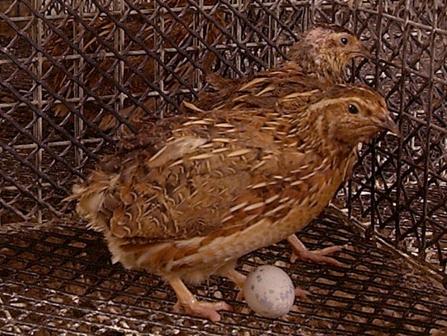Coturnix Quails
Page 1 of 1
 Coturnix Quails
Coturnix Quails
I received two Coturnix from my daughter on September 27, 2015.

This quail is known by many names. Japanese quail, Pharaoh quail, Stubble quail, Nile quail, Bible quail and more. The Latin name of the quail we raise is coturnix coturnix. The coturnix quail originates from Europe, Africa and Asia as a migratory game bird. Since the twelfth century it has been raised in Japan as a pet, for meat and eggs and as a singing bird. We got our initial breeding stock from the Sunday market a few years back.
The Japanese Quail IS a fast growing hardy bird. They are mature at around 6 weeks of age and are laying eggs by around 7-8 weeks of age. I have to say they taste very delicious.
Males are characterized by a rusty brown throat and breast feathers while the hens have a lighter cream colored feathering on the neck with black stripes and dotting on the breast.
We read that grouping of one male to three females will generally produce high fertility but we group ours up as a flock. We maintain the temperature in our breeder house at between 70° to 80° F. You will need adequate ventilation as it is needed to replace stale air with fresh air and to remove any odors.

Egg production is around 280 eggs per year. Eggs should be collected at least once daily and should be stored in a cool place and incubated with the large end up. Eggs lose a little fertility each day they are stored. Daily setting is best if you have a large enough incubator but eggs may be held for up to seven days.
Incubation procedures will depend on the type of incubator you use. Follow your incubator manufacturer’s directions. Natural incubation is also possible using your kampung hens. We have found that our Coturnix hens rarely set their own eggs.
Proper temperature, humidity, turning and ventilation are the most important factors in incubation. Failure in any of these areas will result in a poor hatch. The eggs should be turned a minimum of twice a day. If your incubator does not have an automatic turner you can place an X on the side of an egg with a felt tipped pen. Rotate eggs 180° so the X will be on top one time and on the bottom the next time. This turning does not have to be very exact.
Once a quail chick pips the egg, it may take up to 10 hours for it to fully come out of the shell and it will take an hour or two for it to dry. Normally chicks will all hatch within 24 hours. Chicks can stay in the incubator safely for a day and then they should be transferred to a brooder unit. We just use a wooden crate with a mesh top. A light bulb at one end provides warmth. When chicks are removed from the incubator they must be placed in an area which is heated to 99 ¾° and an unheated area which is much cooler with enough room to move between the two areas as the chicks choose.
If chicks are too cold they will huddle together and on top of each other to try to get warm. If chicks are too hot they will spread out to the furthest edges of the brooder. If the temperature is right the chicks will be active and evenly spread out.
Several food and water locations must be supplied and water receptacles must be of an appropriate size to prevent drowning. You will see that the chicks are tiny even when compared to regular chicken chicks.
At about 4 weeks of age the quails can be placed in breeder cages or on the floor in breeder rooms. They can be placed in an outdoor pen if the weather permits.
Japanese quail can be brooded then grown out in cages or on bedding. In our case we use the grass cuttings and they seem to become very busy going through the cut grass. The cage trays that catch fecal material and bedding material should be cleaned regularly to help prevent disease, odor and fly problems. You must also make sure all feeders, water receptacles and other equipment should be sanitized regularly to help prevent disease.

FinchG- Founder-Admin

 Eggs For Posting : 520
Eggs For Posting : 520
Join date : 2010-10-18
Page 1 of 1
Permissions in this forum:
You cannot reply to topics in this forum|
|
|

 Home
Home